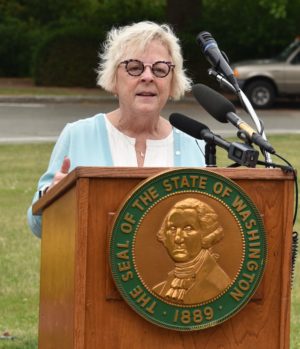Washington is facing two big challenges when it comes to childcare.
The first is access to safe and reliable care, and the second is maintaining a strong, stable workforce. Senate Bill 5225 will help solve both.

In 2021, the Legislature passed the historic Fair Start for Kids Act, which expanded access to the Working Connections Child Care (WCCC) program, which helps reduce the cost of childcare for many families and in turn, supports our youngest learners.
Implementation of the act has been successful and is already helping thousands of families pay for and access affordable childcare — but it was evident in many conversations I have had that more needed to be done.
That is why this year, I brought forward SB 5225 to expand WCCC eligibility to even more families.
Right now, childcare providers are struggling to hire and retain employees. We have more licensed slots in the system than before the pandemic, but fewer kids in care. Often classrooms sit empty because workers cannot find care for their own children.
With the passage of this legislation, those childcare employees will soon have access to Working Connections Child Care. This win-win solution ensures their children have a safe place to go during the day and they themselves can get back to work to care for even more of our young learners.
My colleagues and I also recognized that while many families involved with the court system have access to childcare to help them recover, our therapeutic court system, which provides treatment for mental health and substance use disorder as part of its mission of rehabilitation, lacks this tool.
Access to childcare will help support parents’ success in these courts, and provide stable, consistent care for their children.

Here in Washington, many families who are already eligible for the program in every way simply do not possess the necessary documentation required by the federal government. SB 5225 provides those parents with access to the WCCC benefits.
Not only will this help these parents, but it will also, in turn, help address our current workforce shortages.
To further boost our childcare workforce, we also took action this session with SB 5316 to decrease systemic delays and costs that were keeping applicants from getting down to work.
State law requires background checks when the Department of Children, Youth and Families is approving applicants to our childcare workforce.
This is important for the safety of kids in our care, but it introduces delays between when someone accepts a job and when they can begin work.
When background fees were suspended during the pandemic, we learned that simply removing the requirement for payment saved several days in the process.
When payment does not have to be handed from person to person, it saves time, and every day saved is a day sooner that person can get to work.
Not only does waiving these fees speed up the process of getting approved applicants into positions, but it also removes a cost that too often keeps qualified workers from applying in the first place.
Helping childcare providers is a crucial part of solving the childcare crisis. They are the backbone of the industry and their ability to offer safe, stable care is essential for Washington families.
This legislative session, we focused on removing some of the roadblocks that were standing in the way. I am proud to have championed these two bills to increase support and resources for our providers, which will help even more families across Washington lead better, less stressful lives.
About the author
Senator Claire Wilson (D‑Auburn) represents the 30th Legislative District, chairs the Senate Human Services Committee and is vice chair of the Senate Early Learning and K‑12 Committee. She championed the landmark Fair Start for Kids Act, which invested $1.1 billion to make childcare and early learning more affordable for Washington families.

